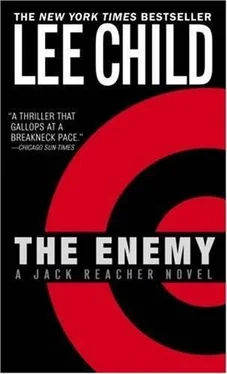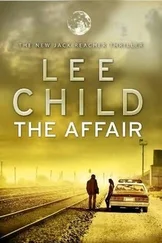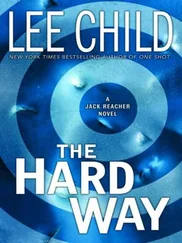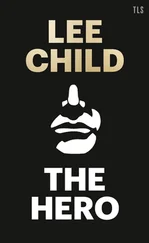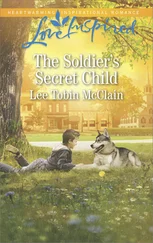Then I shot him through the center of the forehead.
It wasa typical nine-millimeter full metal jacket through and through. It put the back of his skull into the cupboard behind him and left it there with a lot of smashed china. I stuffed the reefer and the speed and the crack cocaine in his pockets, along with a symbolic roll of dollar bills. Then I walked out the back door and away through his yard. I slipped through the fence and through the lot behind his and walked back to my car. I sat in the driver’s seat and opened my duffel and changed my boots. Took off the pair that had been ruined in the Mojave and put on a better pair. Then I drove west, toward Dulles. Into the Hertz return bays. Car rental bosses aren’t dumb. They know people get cars messy. They know they accumulate all kinds of crap inside. So they position big garbage cans near the return bays in the hope that renters will do the decent thing and clear some of the crap out themselves. That way they save on wages. Cut out even a minute a car, and staff costs drop a lot over a whole year. I put my old boots in one can, and the Beretta in another. As many cars as Hertz rented at Dulles in a day, those cans were headed for the crusher on a regular basis.
I walked all the way to the terminal. I didn’t feel like taking the bus. I showed my military ID and used my checkbook and bought a one-way ticket to Paris, on the same Air France red-eye Joe had taken back when the world was different.
I gotto the Avenue Rapp at eight in the morning. Joe told me the cars were coming at ten. So I shaved and showered in the guest bathroom and found my mother’s ironing board and pressed my Class A uniform very carefully. I found polish in a cupboard and shined my shoes. Then I dressed. I put my full array of medals on, all four rows. I followed the Correct Order of Wear regulations and the Wear of Full Size Medals regulations. Each one hung down neatly over the ribbon in the row below. I used a cloth and cleaned them. I cleaned my other badges too, including my major’s oak leaves, one last time. Then I went into the white-painted living room to wait.
Joe was in a black suit. I was no expert on clothing but I figured it was new. It was some kind of a fine material. Silk, maybe. Or cashmere. I didn’t know. It was beautifully cut. He had a white shirt and a black tie. Black shoes. He looked good. I had never seen him look better. He was holding up. He was a little strained around the eyes, maybe. We didn’t talk. Just waited.
At five to ten we went down to the street. The corbillard showed up right on time, from the dépôt mortuaire . Behind it was a black Citroën limousine. We got in the limousine and closed the doors and it moved off after the hearse, slow and quiet.
“Just us?” I said.
“The others are meeting us there.”
“Who’s coming?”
“Lamonnier,” he said. “Some of her friends.”
“Where are we doing it?”
“Père-Lachaise,” he said.
I nodded. Père-Lachaise was a famous old cemetery. Some kind of a special place. I figured maybe my mother’s Resistance history entitled her to be buried there. Maybe Lamonnier had fixed it.
“There’s an offer in on the apartment,” Joe said.
“How much?”
“In dollars your share would be about sixty thousand.”
“I don’t want it,” I said. “Give my share to Lamonnier. Tell him to find whatever old guys are still alive and spread it around. He’ll know some organizations.”
“Old soldiers?”
“Old anybody. Whoever did the right thing at the right time.”
“You sure? You might need it.”
“I’d rather not have it.”
“OK,” he said. “Your choice.”
I watched out the windows. It was a gray day. The honey tones of Paris were beaten down by the weather. The river was sluggish, like molten iron. We drove through the Place de la Bastille. Père-Lachaise was up in the northeast. Not far, but not so near you thought of it as close. We got out of the car near a little booth that sold maps to the famous graves. All kinds of people were buried at Père-Lachaise: Chopin, Molière, Edith Piaf, Jim Morrison.
There were people waiting for us at the cemetery gate. There was the concierge from my mother’s building, and two other women I didn’t know. The croques-morts lifted the coffin up on their shoulders. They held it steady for a second and then set off at a slow march. Joe and I fell in behind, side by side. The three women followed us. The air was cold. We walked along gritty paths between strange European mausoleums and headstones. Eventually we came to an open grave. Excavated earth was piled neatly on one side of it and covered with a green carpet that I guessed was supposed to look like grass. Lamonnier was waiting there for us. I guessed he had gotten there well ahead of time. He probably walked slower than a funeral. Probably hadn’t wanted to hold us up, or embarrass himself.
The pallbearers set the coffin down on rope slings that were already laid out in position. Then they picked it up again and maneuvered it over the hole and used the ropes to lower it down gently. Into the hole. There was a man who read some stuff from a book. I heard the words in French and their English translations drifted through my mind. Dust to dust, certain it is, vale of tears . I didn’t really pay attention. I just looked at the coffin, down in the hole.
The man finished speaking and one of the pallbearers pulled back the green carpet and Joe scooped up a handful of dirt. He weighed it in his palm and then threw it down on the coffin lid. It thumped on the wood. The man with the book did the same thing. Then the concierge. Then both of the other women. Then Lamonnier. He lurched over on his awkward canes and bent down and filled his hand with earth. Paused with his eyes full of tears and just turned his wrist so that the dirt trailed out of his fist like water.
I stepped up and put my hand to my heart and slipped my Silver Star off its pin. Held it in my palm. The Silver Star is a beautiful medal. It has a tiny silver star in the center of a much larger gold one. It has a bright silk ribbon in red, white, and blue, all shot through with a watermark. Mine was engraved on the back: J. Reacher . I thought: J for Josephine . I tossed it down in the hole. It hit the coffin and bounced once and landed right side up, a little gleam of light in the grayness.
I calledlong-distance from the Avenue Rapp and got orders back to Panama. Joe and I ate a late lunch together and promised to stay in better touch. Then I headed back to the airport and flew through London and Miami and picked up a transport south. As a newly minted captain I was given a company to command. We were tasked to maintain order in Panama City during the Just Cause endgame. It was fun. I had a decent bunch of guys. Being out in the field again was refreshing. And the coffee was as good as ever. They ship it wherever we go, in cans as big as oil drums.
I never went back to Fort Bird. Never saw that sergeant again, the one with the baby son. I thought of her sometimes, when force reduction began to bite. I never saw Summer again either. I heard she talked up Kramer’s agenda so much that JAG Corps wanted the death penalty for treason, and then she finessed confessions out of Vassell and Coomer and Marshall on all the other stuff in exchange for life in prison. I heard she got promoted to captain the day after they went to Leavenworth. So she and I ended up on the same pay grade. We met in the middle. But our paths never crossed again.
I never went back to Paris either. I meant to. I thought I might go climb down under the Pont des Invalides, late at night, and just sniff the air. But it never happened. I was in the army, and I was always where someone else told me to be.
Читать дальше
